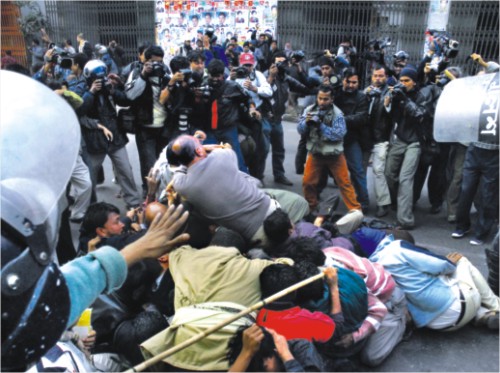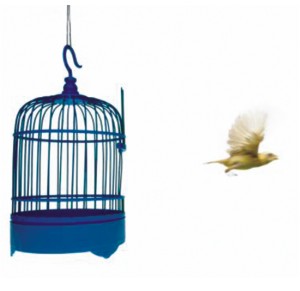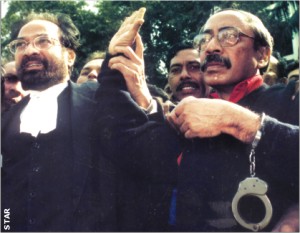
Inside
|
Wanted: Open minds Asif Saleh looks for healthy discussion without getting labelled One of the biggest casualties of the post-1/11 scenario is the loss of a space for a healthy dialog without getting labelled. It seems now people are very afraid to take any firm stand on any issue for the fear of being labelled. The civil society in Dhaka is fragmented into multiple brackets. How much of it is ideological and how much of it is simply about access? Without packaging people up in multiple labels, it seems not many people are willing to engage in evidence based criticisms and arguments. Say a good thing about the government, you are automatically branded as stooge of the army. Talk about due process for political leaders, you are branded as someone who wants to go back to pre-1/11 days. Say that religion based politics should not be banned for the sake of democracy, and you are branded as a rajakar/Jamati. We talk about partisan politics ruining our country, but if you look at the people in the chattering class, you can see the division is much deeper. Are they engaged in any less bickering? Amid all this fragmentation, the real issues of long term solutions are getting lost. Sad thing is that some of the people who are engaged in this myopic exercise are very much capable of bringing up the nuances in the debates. Then why are they not doing that?
In today's Bangladesh, the louder you are in your rhetoric, the more the chance that you will be heard. You will be sought after by the talk shows and you will be noticed. In short, it pays to be rhetorical rather than analytical. But what do we do as audience and how do we judge people's stand on issues? We can look at the track record for consistency and also how evidence based these people are in their criticisms or adulations. Maybe it is because the nuances of the stand of long term relief as well as providing short term relief is being misinterpreted as being a soft stand. Can we fault human rights activists for not being vocal about alleged torture on Tareque Rahman when they have been vocal about the larger issue police brutality and due process for years and no one paid any attention? Suddenly, people are noticing now because the victims of such abuse are the high profile political leaders, the very same people who reaped the benefit when the same black system worked in their favour. Does it make a police torture more of a crime when it is perpetrated against a Tareque Rahman rather than a din mojur Shona Mia? Of course not. But defending Shona Mia's cry won't get you headlines. But dare you not come out with a statement in defending Tareque Rahman's rights; you risk to be branded as someone soft on the army. On the contrary, check the track record of some of those who are perceived as most vocal against human rights abuse today. Some of them perhaps are genuine, but some of them have actively and passively aided past governments when they were violating human rights with impunity. Take a grain of salt, the next time you see these people on talk shows.
Was he vocal when similar violations were going on ahead of every big government protest in the past five years? Why was he defending the government during mass arbitrary arrests when at the same time the organisation he founded was producing reports of gross violation of human rights? What did he do to turn things around being a human rights activist when he was part of the government? It is important for people to offer alternative solutions and defend their position on why they were not able to speak out when they were in positions to make changes happen. Then also there are the cases of other human rights activists who could never reconcile their roles as human rights activists and their partisan roles for political parties in the past as well. You would not hear these questions now, because if you do, very likely you will be branded an army apologist. This is not intended as a finger pointing exercise, but an example of people needing to be aware not just about the message but also who the message is coming from. Because at the end of the day, we need to hold not just the politicians but everyone (including me) accountable for their actions as well, and we are noticing that under the wrapper of vocal criticism of the government and all the careless whispers, the real issue of long term relief is not being debated. This is where journalists and reporters have a critical role by holding the politicians accountable as well (in addition to the current government). When I hear a newspaper editor go on live TV and indirectly accuse Amnesty and its chief of being Western puppets, I cringe because I expect him to know that Amnesty is not government-funded and is one of the few organisations who came out very strongly against the tactics applied in the name of the "war on terror" -- and the fact that he got a lot of claps in Bangladesh for that interview says volumes about the current state of things. When some of the leading newspapers have apparently decided to bury their traditional role of being a watchdog of the nation, naturally any dissent or anyone even remotely perceived to be filling that role is bound to get the cheers. But amid this chaos, the real substance of the debate is lost.
Amnesty (and, indeed, other organisations who have been similarly criticised) has, in fact, asked for genuine commitment from the leadership in addressing human rights abuses in Bangladesh and has asked for systemic reforms for years. It is unrealistic to expect from them statements actions every time a national leader is denied their human rights or every time they complain about torture. It is also rather immature to throw labels just because they do not say the things that one would like them to say. More important to find at the same time of addressing the current issue, whether the issue of longer term relief is addressed as well. When Tareque Rahman complains about torture, we can empathise for his rights and speak out against torture by all means, but also we should do not forget to ask him why he was a part of a government where torture took place with impunity and extra judicial killings were a norm. We should not forget to ask him why human rights defenders were charged with treason and labelled enemy of Bangladesh for speaking out on these issues. Also, we need to ask him what his party would do if they come to power again on similar issues now that he has seen the other side of being a victim of it as well. Will he repeal the black laws of Bangladesh or will he be perfectly happy keeping them intact as long as the system works for him? I am sure we can expect this much consistency from our reporters and editors. As for me, I want to ask him whether human rights organisations like Drishtipat will still be called anti-Bangladesh for speaking out on rights issues, or whether human rights activists and journalists like Priscilla Raj and Saleem Samad will again be charged with treason for helping with reports on religious extremism. I would like to ask Sheikh Hasina whether journalists like Tipu Sultan will be called "information terrorists" again. If we can get a commitment from them now that such things will never happen again and this commitment is kept after they come to power, only then something positive will come out of this noise. We need to now look beyond the election of 2008.
Election as early as possible is a must, but let's face it -- these systemic issues will not go away as soon as an elected government comes to power. As we are heading towards election, not only we need to be vigilant about a free, fair, and meaningful election, we also need to start asking tough questions to the political parties to hear about their agenda and commitment on fixing the system when they come to power after the election. Too often we are happy to bury important conversations for short term relief. I hope we don't make the same mistake now. I can only pray and hope that some people who are in a position to have an honest debate are not disingenuous in their arguments and keep this big picture in mind. And, of course, lastly, please don't label me anyone's dalal. As a friend once wrote before we are all only dalals of Bangladesh. Asif Saleh is the Executive Director of Drishtipat, a global human rights organisation, and recently visited Bangladesh as part of the high level mission from Amnesty International. |

 It was a bit ironic when I saw a former deputy attorney general of the BNP-Jamaat government, who actively defended the government in various cases of human rights abuse, on a TV show talking about the travesty of justice in arresting people without warrants and proper charges. The message is a good and correct one, but you have to question the messenger's track record as well.
It was a bit ironic when I saw a former deputy attorney general of the BNP-Jamaat government, who actively defended the government in various cases of human rights abuse, on a TV show talking about the travesty of justice in arresting people without warrants and proper charges. The message is a good and correct one, but you have to question the messenger's track record as well. Editorials have been written about the Amnesty chief's supposed "balancing act" but not much space was spared in the paper on the five recommendations placed by the Amnesty chief to fix the current malaise in the system.
Editorials have been written about the Amnesty chief's supposed "balancing act" but not much space was spared in the paper on the five recommendations placed by the Amnesty chief to fix the current malaise in the system.  Labelling and creating controversy is easy. But what is difficult is to step back and take a longer term view of issues. Just because I am criticising some aspects of the government now does not mean that I am an admirer of what happened in the past regimes. Similarly, just because I admire some of the changes in the administration post-1/11 does not mean that I am a propagandist for the military-backed government.
Labelling and creating controversy is easy. But what is difficult is to step back and take a longer term view of issues. Just because I am criticising some aspects of the government now does not mean that I am an admirer of what happened in the past regimes. Similarly, just because I admire some of the changes in the administration post-1/11 does not mean that I am a propagandist for the military-backed government.